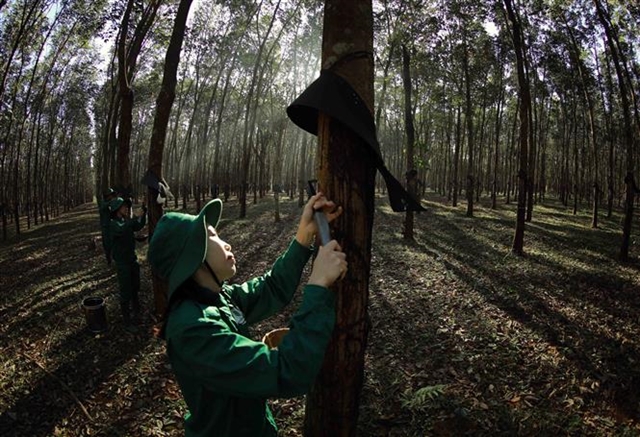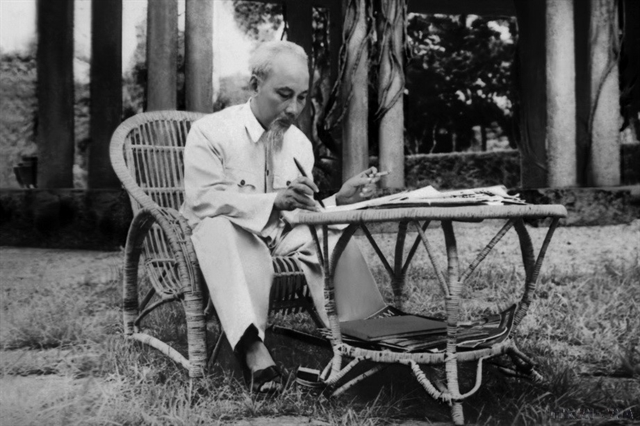 Economy
Economy

 |
| Workers at a rubber plantation in the central highland province of Gia Lai. VNA/VNS Photo Vũ Sinh |
HÀ NỘI — All Việt Nam's rubber’s top 15 export markets saw growth in export values in 2024, with Malaysia recording the highest increase, expanding fivefold, followed by Sri Lanka at 3.7 times, according to the Việt Nam Rubber Association (VRA).
China, despite showing the lowest growth rate at 1.5 per cent, remained Việt Nam's largest export market for rubber, accounting for 67.6 per cent of the total market share. Other key markets included India (7.7 per cent), the EU (6 per cent) and South Korea (2.5 per cent).
According to the VRA, China’s demand is driven by its booming electric and hybrid vehicle industries, particularly for tyre production. However, Việt Nam predominantly exports natural rubber blends and semi-processed products to China, with deeply processed rubber contributing minimally. In 2023, Việt Nam exported 1.7 million tonnes of rubber to China, generating US$2.27 billion, nearly 80 per cent of the total export volume and 78.5 per cent of total value.
To increase export value and reduce reliance on the Chinese market, the Việt Nam Rubber Association has urged exporters to prioritise processed rubber and expand into new markets, particularly the EU.
Global trade in rubber and rubber products, valued at $240–250 billion, sees the EU as the largest importer and exporter. The EU accounts for 31–34.5 per cent of global rubber exports and imports approximately $75 billion in rubber products annually.
In 2023, Việt Nam exported nearly $470 million worth of raw and processed rubber to the EU, representing 6.5 per cent of the industry's total export revenue.
Việt Nam's rubber exports experienced mixed outcomes in the first 11 months of 2024, with a six per cent decline in volume but a 17.1 per cent surge in value compared to the same period in 2023. This increase in export value is attributed to a 24.6 per cent rise in the average export price, reaching $1,675 per tonne.
The Ministry of Agriculture and Rural Development reported that November's exports totalled 220,000 tonnes, valued at $424.3 million. Cumulatively, Việt Nam exported 1.8 million tonnes of rubber during the period, generating $2.95 billion in revenue.
EU anti-deforestation standards
In a recent development, the Việt Nam Rubber Group (VRG) announced steps to comply with the European Union's anti-deforestation regulations (EUDR), which take effect in January 2025 for large enterprises. Rubber is one of three Vietnamese exports affected, alongside timber and coffee.
VRG's Vice General Director,Trương Minh Trung,confirmed that 18 VRG member units had received sustainable forest management certifications under the VFCS/PEFC system, covering 120,000 hectares. Additionally, 38 factories had achieved PEFC-CoC certification, allowing them to produce over 100,000 tonnes of certified rubber annually.
Three VRG member companies, the Đồng Nai Rubber Corporation, the Dầu Tiếng Rubber Company and the Chư Sê Kampong Thom Rubber Company, had already fulfilled EUDR requirements, with their products accepted by European clients.
Việt Nam's rubber supply chain faces traceability challenges, particularly from smallholder plantations, which lack land-use certification and involve complex intermediary processes. Imported rubber, primarily from Cambodia (80 per cent) and Laos, presents similar difficulties.
With the EU delaying EUDR enforcement to January 2025, Việt Nam continues to address compliance gaps. By focusing on value-added products and meeting international standards, the nation aims to strengthen its position in global rubber markets, particularly within the EU, a critical export destination. — VNS




